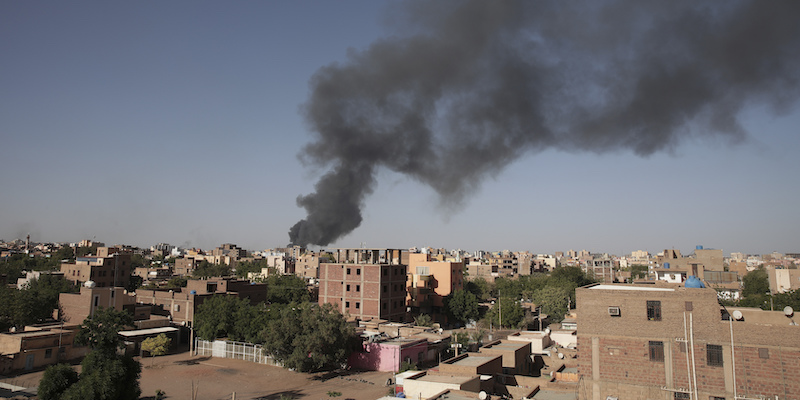In Sudan, for the past two weeks, the regular army and the powerful Rapid Support Forces (RSF) paramilitary group have been fighting a war that has already caused at least 528 deaths and more than 4,000 injuries. A truce has officially been underway since last Monday, extended on Sunday for another three days, which should allow the evacuation of civilians from the areas most affected by the clashes.
In reality these interruptions of the fighting, decided and announced by both sides on strong international pressure, do not seem to hold up. Above all in two regions, that of the capital Khartoum and that of western Darfur, the clashes have never stopped: there are numerous testimonies of shootings, artillery strikes and even aerial bombardments.
As always in these cases, the two parties accuse each other of the violations. On one side there are the forces of General Abdel Fattah al Burhan, who is the head of the regular army and the president of the country, on the other the paramilitaries of the RSF, commanded by General Mohamed Hamdan Dagalo, known as Hemedti, who is also the vice president.
Burhan defines the rivals as “rebels”, but many international analysts underline that the conflict is something more than a clash between the regular army and the “rebels”. The two generals were allies during the military coup in 2021 and are in command of two real armies, well equipped and organized: both have built international relations in recent years, with neighboring countries and also with the Russian Wagner paramilitary group , present in the country since 2014.
Strong international pressure and the will of the two generals to present themselves as credible interlocutors have led since the beginning of last week to the announcement of the truce and subsequent extensions. But although the clashes have decreased, both armies seem to have carried out some operations considered militarily important this week, making many districts of the capital and entire regions of the country dangerous for the civilian population.
In particular, the regular army is trying to drive out General Dagalo’s forces from the capital, also exploiting the air forces: Burhan is the only one with warplanes available, while the RSF are organizing a guerrilla war in the capital, garrisoning not only the numerous barracks, but also private homes. The army bombed various targets in the city with air raids with numerous damages also to the civilian population.
A destroyed house in the capital Khartoum (AP Photo/Marwan Ali)
Furthermore, the paramilitaries of the RSF, according to various testimonies collected by the international media, are hoarding goods and aid by practicing widespread forms of looting, to the detriment of public offices, international organizations, but also of citizens remaining in the capital. Much of the aid and medical supplies appear to have ended up in the hands of the two warring factions, while more than 70 percent of Khartoum’s hospitals have been forced to close.
The situation is also described as particularly dangerous in Darfur, the western region where from 2003 to 2006 (and then with less intensity also in subsequent years), a bloody civil war was fought which, according to the UN, caused 300,000 deaths and left 2 million homeless. and a half people. Then some rebel armed groups rose up against the Sudanese government, accusing it of discrimination and lack of protection against them. To fight the rebels, the government intervened by hiring the Janjawid, a group of Arab militiamen of Baggara ethnicity (therefore ethnically distant from the inhabitants of Darfur) who attacked numerous villages, killing or torturing tens of thousands of people, being guilty of various war crimes and , according to many interpretations, of genocide.
The RSF paramilitary group fighting for power in Sudan today is a direct descendant of the Janjawid, and general Dagalo during the war was one of the leaders of the militiamen active in Darfur. Tribal violence has restarted in the region: the RSF allegedly attacked some structures in the city of Genena, a city with about 500,000 inhabitants near the border with Chad, to the west, provoking the reaction of some self-organized local militias. In this case, the absence of intervention by the regular army would have increased the chaos, with the involvement of criminal gangs in the conflict and looting.
– Read also: What is Sudan
The situation has led to an exodus of the civilian population: many have moved inside the country, towards areas less affected by the clashes, but according to a UN estimate there are at least 75,000 people displaced abroad from all over the Sudan.
Thousands of people have reached the city of Port Sudan, the main port on the Red Sea, from where some ships depart, especially directed towards the ports of Saudi Arabia. Most of the foreigners were evacuated early last week, but many British and US nationals remain in the country and further evacuations are underway. The rapid flight of international diplomats would have left many Sudanese citizens who had applied for a visa for expatriation without documents: their passports are remained in abandoned embassies.

The German armed forces involved in the evacuation of compatriots (Lars Klemmer/dpa via AP)
A first plane landed in the country on Sunday with aid from the International Red Cross, with a load of eight tons: mainly medical material, sufficient to treat over 1000 wounded. At the moment, even providing basic care is difficult or impossible in certain areas of the country.
According to UN humanitarian crises manager Martin Griffiths, “the speed and scale of the ongoing crisis in Sudan is unprecedented.” There are currently no negotiations to make the truce more stable, just preliminary talks. General Burhan, head of the regular army, has repeatedly repeated that he has no intention of negotiating with General Dagalo unless he first decides to surrender and interrupt all military activity. A condition that the RSFs do not seem to have any intention of accepting.
– Listen to the Globo episode: Understand something of the clashes in Sudan
